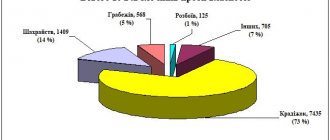The procedure for investigating a criminal case consists of three key stages that are relevant for any crime - from murder to tax evasion.
- Pre-investigation check. At this stage, the presence of elements of a crime is established and a decision is made to initiate a criminal case or to refuse one.
- Consequence. The main phase of the criminal investigation. Interviewing witnesses, conducting examinations, collecting evidence and filing charges. At this stage, it is established who committed the crime, in what way, what damage was caused, etc.
- Court. If the case is successfully (for the investigative authorities, of course) investigated, evidence is collected and charges are brought, it is transferred to the court, where it is decided whether the person accused by the investigation is guilty of committing a crime or not.
One of the most dangerous mistakes of most defendants in criminal cases is the belief that they can go to a lawyer at the trial stage.
No no and one more time no! The sooner a lawyer learns about all the nuances of your case, the sooner he can begin his defense and the more effective it will be. Most professionals spend the bulk of their work during the investigation - seeking to terminate or reclassify (in case of obvious guilt) a criminal case, or laying the groundwork for an active defense in court. If a lawyer only comes to court, then it is much more difficult for him to defend your interests.
At the investigation stage, the following participants can be distinguished:
- Suspect (accused). Everything is clear and understandable - this is a person suspected or accused of committing a crime.
- Victim. Everything is also clear - a person (individual or legal) who has been harmed by a crime.
- Witness. According to the Code of Criminal Procedure, this is a person who can provide any information relevant to the case or has information relevant to the investigation. But in practice, this may well be a potential suspect...
Witnesses should be especially careful. Based on recent practice, the investigation is delaying filing charges for economic crimes until the last minute. For what? They just put their guard down! The investigation can delay the prosecution until the last month of the investigation time limit - 1 year (i.e. 11 months without bringing charges).
Example: The manager or founder is called in for questioning 1-2 times a month. They've been calling me for six months now. He’s already used to it, he doesn’t go with a lawyer, he’s relaxed and may well blurt out something unnecessary. Two months ago I mentioned that I had signed documents. Last month, I mentioned that the accountant had reported problems with taxes. And in this he said that he guessed about a “tax optimization scheme”...
As soon as the investigator collects the necessary evidence and carries out all the examinations, yesterday’s witness is charged. Moreover, unexpectedly and abruptly - during the next call for questioning as a witness.
What to do if called as a witness?
The situation is classic - you have been called in for questioning and during the conversation you understand that the investigator is clearly leading you to something. Bad and dangerous. You have the right to use Art. 51 of the Constitution of the Russian Federation, which gives you the right not to testify against yourself and your close relatives (father and mother, grandfather and grandmother, wife and children).
It is better to come with a lawyer to all interrogations while you are being summoned. Savings or connivance may ultimately backfire, and it will be more difficult for a lawyer to protect you.
If you were summoned for interrogation, but you did not have time to invite a lawyer, were unable to, or decided “I’ll break through,” then be sure to ask for a copy of the interrogation protocol. If the investigator does not give it to you, you have every right to rewrite the protocol completely by hand.
Rewrite all questions, even if you used Art. 51 of the Constitution and did not answer them! It is important and necessary to do this so that the lawyer can evaluate the questions asked of you and draw conclusions about what you are accused of, what dangers you face and what defense tactics to choose. To have material for analysis.
Note: It is better to take notes on everything that is happening yourself and from the first minutes. No one can prohibit you from doing this, and besides, you will be able to clearly remember what exactly you answered to a specific question and compare it with what the investigator wrote down in the interrogation report.
The concept and forms of completing a preliminary investigation
Criminal prosecution is a procedural activity carried out by the prosecution in order to expose a suspect accused of committing a crime (clause 55 of Article 5 of the Code of Criminal Procedure).
The normative regulation of the grounds and procedure for terminating a criminal case and (or) criminal prosecution is contained in Chapter. 4 (vv. 24-28) and ch. 29 (Articles 212-214) of the Code of Criminal Procedure, which establishes the corresponding order (procedure).
The grounds for termination of a criminal case and (or) criminal prosecution are factual circumstances provided for by the criminal and criminal procedural law that entail the impossibility of further proceedings in a criminal case or indicate that there is no need to continue it.
Grounds for termination of a criminal case and (or) criminal prosecution:
- absence of crime event;
- expiration of the statute of limitations for criminal prosecution;
- death of a suspect or accused, with the exception of cases of rehabilitation of the deceased;
- absence of a statement from the victim, if a criminal case can only be initiated based on his statement;
- the absence of a court conclusion on the presence of signs of a crime in the actions of one of the persons specified in paragraphs 2 and 2.1 of part one of Article 448 of this Code, or the absence of consent, respectively, of the Federation Council, the State Duma, the Constitutional Court of the Russian Federation, the qualification board of judges to initiate a criminal case or attract as an accused one of the persons specified in paragraphs 1 and 3 - 5 of part one of Article 448 of this Code;
- reconciliation of the parties.
absence of corpus delicti in the act;
Grounds for termination of criminal prosecution:
- non-involvement of the suspect or accused in the commission of a crime;
- as a result of the amnesty act;
- the presence in relation to the suspect or accused of a sentence on the same charge that has entered into legal force, or a court ruling or a judge's decision to terminate the criminal case on the same charge;
- the presence in relation to the suspect or accused of an unrescinded resolution of the body of inquiry, investigator or prosecutor to terminate the criminal case on the same charge or to refuse to initiate a criminal case;
- refusal of the State Duma of the Federal Assembly of the Russian Federation to give consent to the deprivation of immunity of the President of the Russian Federation who has ceased to exercise his powers, and (or) refusal of the Federation Council to deprive the immunity of this person;
- Article 28. Termination of criminal prosecution due to active repentance;
- Article 28.1. Termination of criminal prosecution in cases of crimes in the sphere of economic activity.
termination of a criminal case on the grounds indicated above;
Termination of a criminal case and (or) criminal prosecution is permitted at all stages of the criminal process. However, the preliminary investigation stage is the first stage of the criminal process, where it becomes possible to make a decision to terminate the criminal case and (or) criminal prosecution.
The grounds and procedure for terminating a criminal case and (or) criminal prosecution are the same regardless of the form in which the preliminary investigation is carried out - in the form of a preliminary investigation or inquiry. After the termination of the criminal case, no investigative actions or procedural decisions are allowed. Based on this, terminated criminal cases are not subject to moving to subsequent stages. Therefore, the termination of a criminal case is the only procedural form of ending the preliminary investigation, allowing the criminal proceedings to be completely completed out of court and a final decision on the case to be made by the investigator (in some cases with the consent of the head of the investigative body) or the interrogating officer (in some cases with the consent of the prosecutor).
It is necessary to distinguish between the concepts of “termination of a criminal case” and “termination of criminal prosecution”. Termination of a criminal case always entails termination of criminal prosecution (Part 3 of Article 24 of the Code of Criminal Procedure). This is due to the fact that criminal prosecution is an integral part of criminal proceedings. Therefore, the termination of a criminal case also excludes the possibility of continuing criminal prosecution within the framework of this criminal case from the moment of its termination. Whereas when criminal prosecution is terminated, the criminal case as a whole does not end. Only the criminal prosecution of a specific person is terminated due to the presence of certain circumstances, and the criminal proceedings continue (Part 4 of Article 27 of the Code of Criminal Procedure).
In addition, the termination of criminal prosecution is always personalized, i.e. criminal proceedings against a specific person or group of persons are terminated. Whereas the termination of a criminal case is not always personalized, because it is possible to terminate criminal procedural activities due to the absence of the crime itself (clause 1, part 1, article 24 of the Code of Criminal Procedure).
What happens after being questioned as a witness?
When the evidence is insufficient to change the status of a witness to a suspect or to bring charges, the investigation begins active work to confirm the guilt of a potential suspect (and legally, still a witness).
These activities include:
- Carrying out examinations.
- Request for information and documents.
- Additional operational activities (surveillance, wiretapping, inspection of correspondence...).
- Removal of documents.
- Interviewing other witnesses.
Based on the results of collecting all the evidence, the investigator brings charges, which can be presented in the future with adjustments and in new “editions”. As new circumstances become clear, new articles are added and other not-so-pleasant “surprises” identified by the investigation.
After the final version of the accusation is presented, the stage of familiarization with the case materials begins. During working hours, with the right to make extracts on the case.
The familiarization procedure can last several days or even months, depending on the volume of the criminal case. The investigator cannot limit your familiarization time without compelling reasons, unless there is a clear delay in the familiarization time.
Article 158 of the Code of Criminal Procedure of the Russian Federation. End of the preliminary investigation (current version)
1. The preliminary investigation may also end with the referral of the criminal case to the prosecutor for transfer to the court for the application of compulsory medical measures against the insane (see commentary to Article 439).
2. Part 2 of the commented article provides for presentation as the main tool in the arsenal of investigative bodies to eliminate the circumstances that contributed to the commission of a crime.
3. The circumstances that contributed to the commission of the crime are part of the subject of proof in a criminal case (Part 2 of Article 73 of the Code of Criminal Procedure). It follows from this that the investigative bodies are obliged to establish them (on the obligation of proof, see the commentary to Article 14), that for this purpose judicial evidence can be obtained, including the necessary investigative actions. As a procedural sanction for failure to fulfill this obligation, the criminal case may be returned for additional investigation by the head of the investigation department (clause 11, part 1, article 39) or the prosecutor (clause 2, part 1, article 221; clauses 2 and 4 Part 1 Article 226).
Thus, the Investigative Committee under the Prosecutor's Office is entrusted with the task of organizing and implementing, within its powers, identifying the causes and conditions conducive to the commission of crimes, taking measures to eliminate them (clause 5, part 2 of the Regulations on the Investigative Committee under the Prosecutor's Office of the Russian Federation, approved by Presidential Decree RF dated August 1, 2007 N 1004 “Questions of the Investigative Committee under the Prosecutor’s Office of the Russian Federation”).
The circumstances that contributed to the commission of a crime are its causes and conditions. Among them, it is customary to distinguish three groups of circumstances: 1) the antisocial orientation of the accused person; 2) the conditions for its formation; 3) the circumstances of the crime. The first group is established within the framework of the personality characteristics of the accused (clause 3, part 1, article 73). The second group is usually established in cases involving minors (clause 2, part 1, article 421). The third group of circumstances is the most extensive to identify in other cases. It includes factors that facilitated the commission of a crime, gave rise to it, and contributed to the onset of more serious consequences.
———————————
See, for example: The theory of evidence in Soviet criminal proceedings. M., 1973. S. 178 - 179; Shestakov D.A. Criminology. St. Petersburg, 2001. P. 133; Gilinsky Ya. Criminology. St. Petersburg, 2002. P. 91.
The presentation can serve as a means to eliminate the circumstances of the second and third groups indicated. In addition to the presentation, the investigative body has the right to use other preventive measures: a) of a procedural nature (measures of procedural coercion - for the circumstances of the first group; instructions to the inquiry body - clause 4, part 2, article 38 of the Code of Criminal Procedure; requirements - part 4, article 21 of the Code of Criminal Procedure); b) of a non-procedural nature (discussions at a meeting, speeches by the investigator in the media, oral messages to officials).
5. According to the provisions of this norm, the presentation must be made at the final stage of the investigation, but before the case is closed or sent to the prosecutor. At the same time, the proposal may be made earlier if its grounds are proven. The submission must meet the requirements of validity and motivation, in particular, it must pay special attention to: a) indicating the circumstances that contributed to the commission of the crime (it is advisable to indicate the evidence on the basis of which they were established); b) specific measures that need to be taken to eliminate these circumstances. In this case, it is necessary to take into account: a) the inadmissibility of interference in the administrative, organizational, managerial, and economic activities of organizations or officials; b) the presumption of innocence. The submission should not state or prejudge the guilt of specific individuals in crimes or administrative offenses.
Comment source:
Ed. A.V. Smirnova “COMMENTARY ON THE CRIMINAL PROCEDURE CODE OF THE RUSSIAN FEDERATION” (ARTICLE BY ARTICLE), 5th edition
SMIRNOV A.V., KALINOVSKY K.B., 2009
Preliminary investigation
At this stage, authorized government bodies and officials collect, verify and evaluate evidence. As a result, a decision may be made to terminate the case or to send the materials to the court with an indictment.
At the stage of preliminary investigation, the investigator or inquiry officer establishes the circumstances of the crime, incriminates the suspect and performs various procedural actions.
Note!
The preliminary investigation ends with the referral of the criminal case to court or its termination.
Features of completing a preliminary investigation with an indictment
Let's consider the nuances of completing the preliminary investigation by drawing up an indictment. The accused and his lawyer, as well as the victim or his representative must be familiar with this document. A certificate about the timing of the inquiry, preventive measures, restrictions, material evidence, etc. is attached to the act.
If a person is accused of a crime for which a fine is imposed, the certificate specifies the specifics of drawing up settlement papers for transferring money to the budget. The indictment is approved by the head of the inquiry body. After this, all collected materials are transferred to the prosecutor. In turn, he decides to send documents to the court.
Completion of the preliminary investigation by drawing up an indictment
If the investigation took the form of a preliminary investigation, it ends with the drawing up of an indictment. The investigator notifies the suspect, his defense attorney, and the injured party about this. Everyone is explained the right to familiarize themselves with the case materials.
The rules for drawing up an indictment are contained in Art. 220 Code of Criminal Procedure of the Russian Federation. It should include:
- date and place of compilation;
- position and full name of the person who compiled it;
- information about the accused;
- circumstances of the crime - place and time, methods, motives, goals, consequences;
- wording of the charge with reference to the law;
- a list of evidence from the prosecution and defense in a brief summary;
- circumstances mitigating and aggravating punishment;
- information about the injured party;
- a list of persons who need to be summoned to court.



